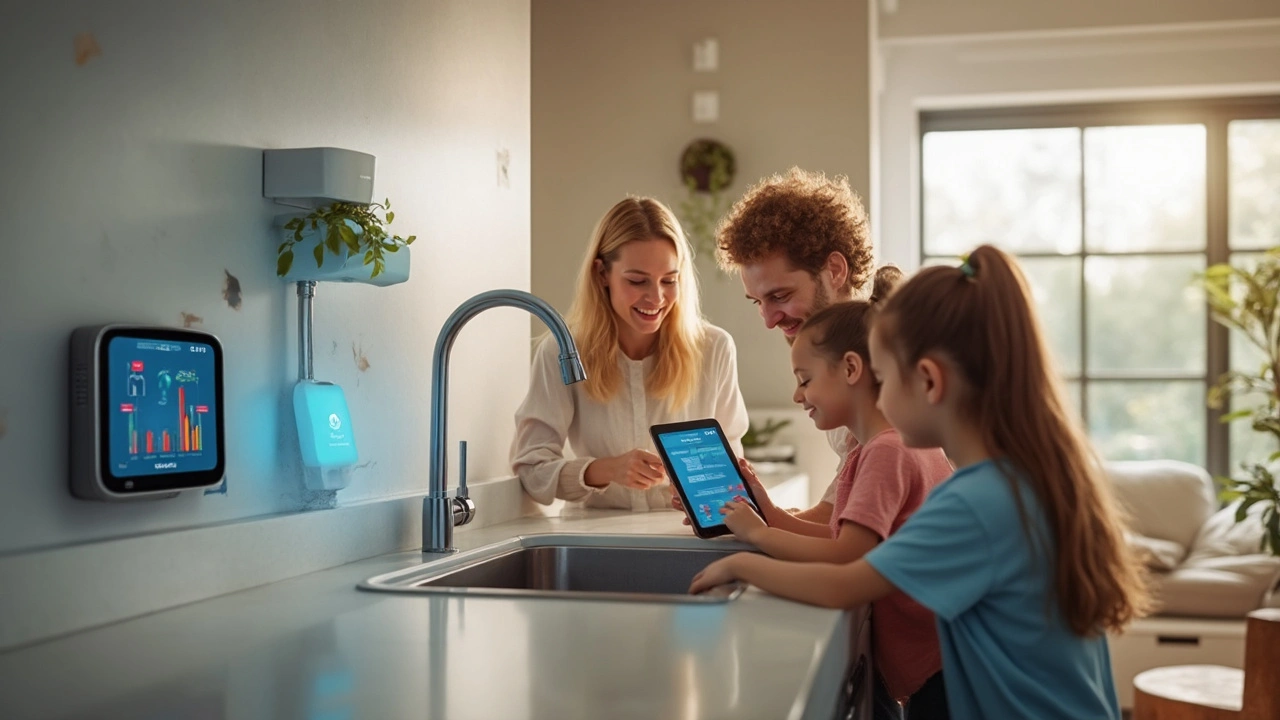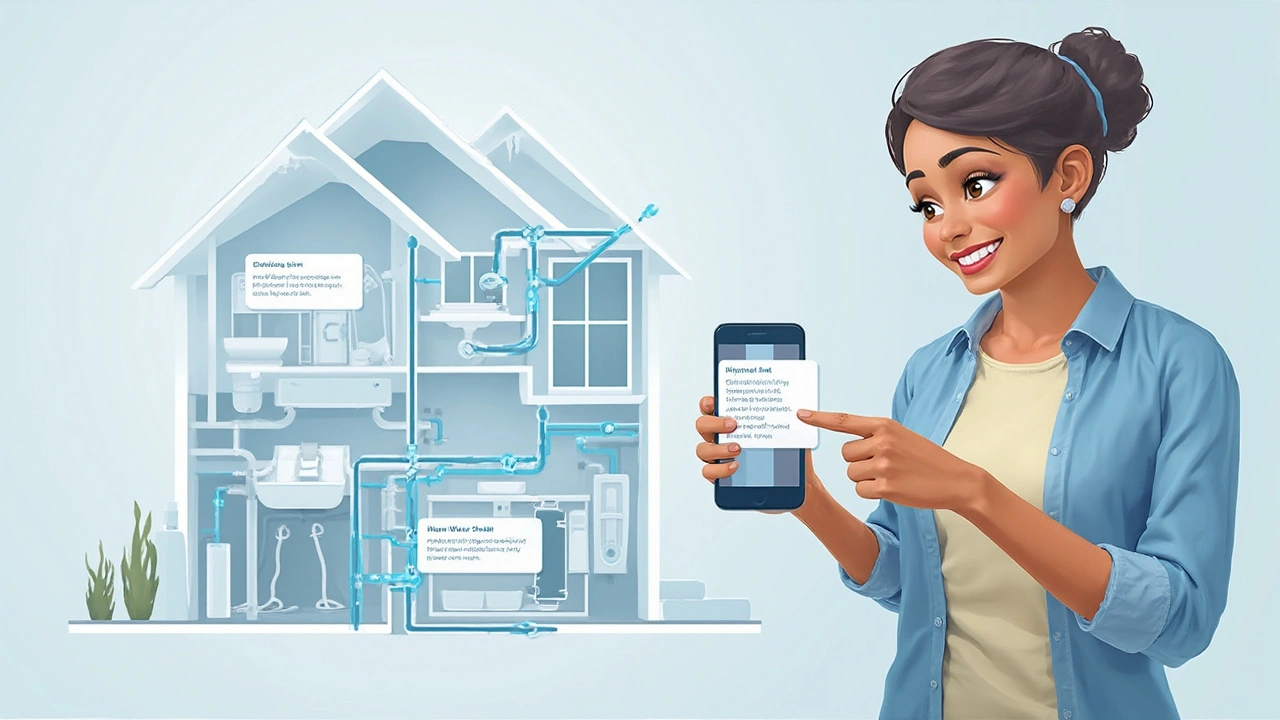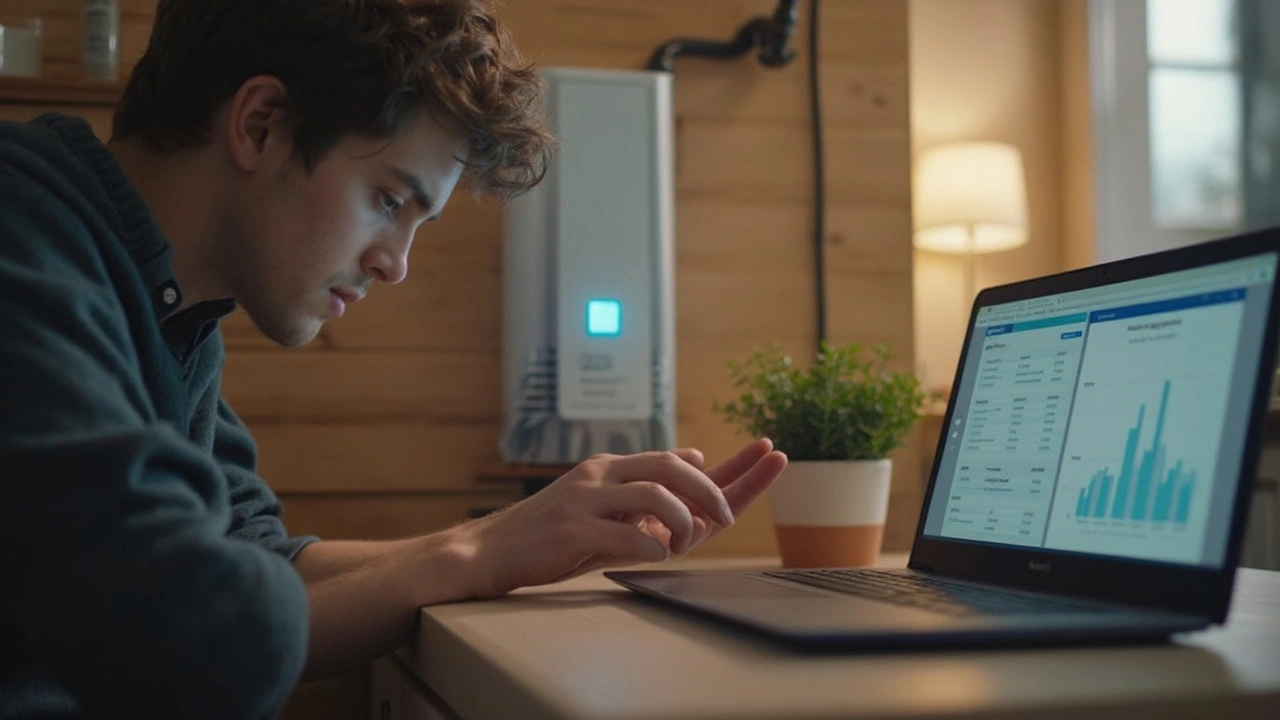
Technology June 22, 2025
Hydrocl: The Smart Solution for Water Usage and Leak Detection
Picture this: you get a spike in your water bill, but don't have the faintest idea where all that water went. You're not alone—water leaks are invisible enemies for thousands of UK households. Enter Hydrocl, a smart water monitoring gadget that's about to change the game for home water management. It quietly tracks water flow around the clock, lets you see where you’re wasting water, and sends you alerts if something’s not right. People have started calling it the Fitbit for your pipes. Why? Because it gives you real-time data, control, and the peace of mind that you deserve. You’ll wonder how you ever lived without it.
What Is Hydrocl and How Does It Work?
Hydrocl is designed to slip onto your home’s main water line and act as your personal water detective. Most models are quick to install and don’t even require a plumber—though a little DIY confidence definitely helps. It’s not a basic water meter like the ones utilities use. Hydrocl goes way beyond, recording flow rates, overall usage, and hunting down even the sneakiest leaks by picking up the tiniest irregularities in pressure or flow.
So how does Hydrocl make sense of all that data? Think of it like a super-sensitive ear pressed up against your pipes. It uses acoustic sensors and advanced algorithms to separate the normal whirs from the suspicious ones. When something unusual pops up—a dripping tap nobody noticed, a sneaky leak under the floor, or a hose left running—it pings your phone. Hydrocl's app gives minute-by-minute breakdowns, weekly stats, and even friendly nudges if your morning shower has turned into an all-day spa.
The science behind it is fascinating. Acoustic sensors literally 'listen' to water movement; machine learning then learns your habits and pinpoints anything that's off. Independent tests found Hydrocl could detect leaks as small as 0.01 litres per minute—that's a single dripping tap leaking enough water to fill a bath every month. Many devices on the market claim they're "smart" but stumble when it comes to accuracy. Hydrocl is different, with a 95% accuracy rate verified by a 2024 Which? lab review, making it one of the most reliable devices currently sold in the UK.
A key feature is the automatic shutoff. If Hydrocl detects a serious leak, like a burst pipe, it can send a command to your smart shutoff valve to stop the flow, saving your kitchen (and wallet) from disaster. This has saved Bristol households, on average, £177 a year in avoided water damage claims and repairs since late 2023.
What about privacy? Data is encrypted and never sold to third parties. Only you have access unless you choose to share your usage trends with your plumber or your utility company.
| Feature | Hydrocl | Standard Water Meter |
|---|---|---|
| Real-time data | Yes | No |
| Leak detection | Yes (0.01L/min accuracy!) | No |
| Mobile alerts | Yes | No |
| Auto shutoff option | Yes | No |
| DIY installation possible | Yes | No |
Why Homeowners Are Adopting Hydrocl
The surge in Hydrocl use isn’t just about being techy; it’s about saving water, cash, and a lot of headaches. After a big drought in the South West in spring 2023, water wastage became a hot topic. Households in Bristol, Bath, and Cardiff quickly realized how much water leaks were costing them once they started tracking—and the numbers shocked everyone. For context, Thames Water estimates UK households lose over 933 million litres to leaks every single day. That’s enough to fill over 370 Olympic pools. And what does all that mean for you? Higher bills, unnecessary stress, and serious eco-guilt.
Hydrocl steps in here, giving you the power to spot and tackle issues before they snowball. Imagine catching a toilet cistern that keeps refilling at 2am, or a slow seep beneath a washing machine, in time to fix it before it drips into the neighbour’s ceiling downstairs. Insurance providers in the UK have started to take note: Direct Line and Aviva now offer small discounts if you show proof of an active leak sensor at home because claims for water damage have dropped by nearly 12% among smart water device users in 2024.
Your utility isn’t just billing for water you use—you're charged for leaks you don’t even see. That old outdoor tap may be costing you £100 a year and you’d never know until you get a monster bill. Hydrocl connects to your WiFi, so you can see right on your phone exactly when and where spikes occur. I’ve seen households cut water use by 20-30% with daily feedback, just by spotting wasted water and correcting small habits: shorter showers, fixing dripping taps, catching kids leaving hoses running on sunny days.
Many owners love the "insight" the gadget gives. One mum in Fishponds told me she finally solved the mystery of her vanishing hot water—turns out, a hidden leaky heating valve in the airing cupboard was the culprit. There’s something empowering about understanding exactly what’s happening with the water in your home, right down to the litre. If you want to teach your kids (or yourself) about sustainability, there’s nothing quite as effective as seeing your own usage in real numbers and pounds saved on your next bill.

Best Spots to Install Hydrocl in Your Home
Picking the right spot makes all the difference. If you want your Hydrocl sensor to keep an eye on your whole house, the best place is usually right after your internal stopcock or main incoming pipe. That way, it gets every drop coming into your place—showers, taps, cisterns, even the garden hose. If you only care about a problem area, like a basement prone to flooding, you can set up Hydrocl on just that zone’s supply line.
Now, lots of older UK homes have slightly tricky plumbing, so double-check what your main pipe looks like—the average Bristol semi probably has a 15mm or 22mm copper or plastic pipe. Modern Hydrocl units come with a variety of adapters, and installation takes about 30 minutes for anyone comfortable with basic household repairs. If tools make your hands sweaty, don’t worry; local plumbers in Bristol are now familiar with these gadgets and typically charge £60-£100 for professional fitting.
Some tips to get the most out of your Hydrocl:
- Skip spots with a lot of vibration or electrical interference (too close to your boiler or main consumer unit is a bad idea).
- Install before any water softeners or filters to make sure you monitor raw usage—some water softeners "clean" by running cycles at night, which can look like leaks if they're downstream.
- Keep the device dry and check the app for firmware updates to improve leak-detection accuracy.
- Add a Hydrocl module near outside pipes or granny flats—many are battery-powered and last two years before needing a swap.
The clever bit? You can add more sensors to build up a full picture—kitchen, bathroom, utility room—so you’re never left guessing where the water’s going. It’s a smart move, especially if you own a rental property or manage a flat share. Tenants can get alerts too, so it’s not all on your shoulders if something goes wild at 3am.
Hydrocl Features That Actually Make a Difference
There are a lot of flashy gadgets in the smart home world, but Hydrocl’s killer features are all about making life easier. The Hydrocl app is super user-friendly. You don’t need to be a tech wiz—if you can use WhatsApp, this will be a breeze. The interface shows your usage in real time, breaks down by hour, day, or month, and even guesses which appliances are using the most water, using AI-driven profiles that get smarter over time.
The biggest win is the leak detection wizardry. During a test run for a local Bristol landlord group, Hydrocl identified a pinhole leak in an attic flat visible only as a tiny blip—literally less than a glass of water lost per day. Most tenants wouldn’t notice, but over six months? That could mean hundreds of pounds in damage and sky-high bills. Hydrocl’s push notifications let you fix issues early and avoid those phone calls no landlord wants.
Setting up zones is handy if you have a big house or want to watch an outbuilding, garage, or outside tap. You can even set custom alerts—say, if water flow starts before 5am, when everyone’s asleep, or if usage spikes during school holidays. Hydrocl integrates with smart home systems like Google Home or Alexa, if you’re into voice control or want it all in one dashboard.
Keep an eye on the software updates; Hydrocl rolls these out every couple of months. The newest update, from April 2025, added improved AI detection for low-flow leaks in combi boiler systems, fixing a common grumble from users in homes with older heating. Plus, the battery backup now lasts longer if your power cuts out—very useful in those autumn storms Bristol gets every year.
If you want to up your sustainability game, Hydrocl offers personalised water-saving tips based on your past habits. The app might nudge you to fix inefficient showers, run only full laundry loads, or find that one dripping tap that’s been quietly sending 110 litres a week down the drain. Real numbers, visible proof—it’s a lot easier to get everyone in your house to join in when the evidence is right there on their phone.

Smart Ways to Reduce Water Bills With Hydrocl
Having Hydrocl is like having a savvy friend constantly looking for waste and savings. There are a few clever tricks to squeeze every drop of value from your device:
- Track peaks and valleys: Notice when usage jumps—morning rush, before bed, or random spikes. Compare with your habits to identify inefficient routines.
- Set up leak alerts for odd hours: Most leaks happen when you’re asleep or at work. If water is running at 2am, it’s probably trouble.
- Pair with a smart shutoff valve: This isn’t just a gimmick. A couple in Redland avoided thousands in water damage when a burst washing machine got spotted and shut off automatically while they were away in Spain.
- Audit your outdoor taps and hoses: Hydrocl can expose those leaky garden hoses or irrigation systems you forget about. Fixing one leaking tap can save up to 5,500 litres a year—enough for 70 loads of laundry.
- Review weekly usage: Most people underestimate how much water they use. With visibility, you can nudge your family to shorter showers or full dishwasher loads.
For families, Hydrocl turns saving water into a game. Who can use the least this week? (Spoiler: teens and toddlers almost always blow the numbers.) Some UK councils started pilot schemes in 2024 to promote Hydrocl in homes with water poverty risk—early results suggest a 17% water saving over six months, just from the awareness boost alone.
Even landlords and building managers are jumping in. With multiple tenants or flats sharing meters, pinpointing leaks or unfair usage used to be a headache. Now you get a clear breakdown by flat or zone, making disputes over shared bills (almost) painless. Plus, it doesn’t hurt that your insurance company might give you a nudge to install one, too. Your wallet, your tenants, and the planet all come out ahead.
Write a comment
Items marked with * are required.






5 Comments
Geoff Heredia June 27, 2025 AT 17:01
Okay but what if Hydrocl is just a government spy tool disguised as a water monitor? 🤔 I read somewhere that smart home devices send data to agencies under "water security" programs. They already know when you shower, how long, and if you flush twice. This thing probably logs your entire water usage pattern and sells it to advertisers-or worse, the Met Office for climate control experiments. I’m not installing this until there’s a firmware audit. #NotMyPipes
Tina Dinh June 29, 2025 AT 16:07
OMG I JUST GOT ONE!!! 🎉💧 I was skeptical but my water bill dropped 30% in 2 weeks!! I caught my kid’s bathtub leak at 3am and fixed it before the ceiling collapsed 😱 Also, the app is so cute-it gives me little badges for saving water like I’m in a game!! 🏅💚 My whole family is now competing to see who uses the least water… and yes, my 7-year-old is winning. #HydroclMagic #WaterWarrior
Andrew Keh June 30, 2025 AT 23:25
This is a thoughtful and well-researched product. The technical details about acoustic sensors and machine learning are accurate and clearly explained. I appreciate that the manufacturer prioritizes privacy and does not sell user data. Installation guidance is practical, and the integration with smart home systems is a useful feature for those already invested in that ecosystem. The data on water savings and insurance discounts is compelling and suggests this device delivers real-world value. For homeowners concerned about efficiency and long-term cost, this is a reasonable investment.
Peter Lubem Ause July 2, 2025 AT 17:02
Let me tell you something important: water waste is not just about money-it’s about dignity. In parts of Nigeria, people walk miles for clean water while here, we’re leaking enough to fill Olympic pools every day. Hydrocl isn’t just a gadget; it’s a moral tool. It turns abstract conservation into concrete action. One user in Bristol fixed a leak that was wasting 110 liters a week-imagine that multiplied across a city, a country, a continent. This device doesn’t just save water-it restores accountability. And yes, the app updates are impressive. The April 2025 patch for combi boilers? That’s engineering that listens to real people. Don’t buy this because it’s trendy. Buy it because you owe it to the planet-and to the next generation who won’t have the luxury of taking water for granted.
linda wood July 3, 2025 AT 01:49
Wow. A device that tells you when your shower is too long. What’s next? A smart toilet that judges your bowel movements? 😏